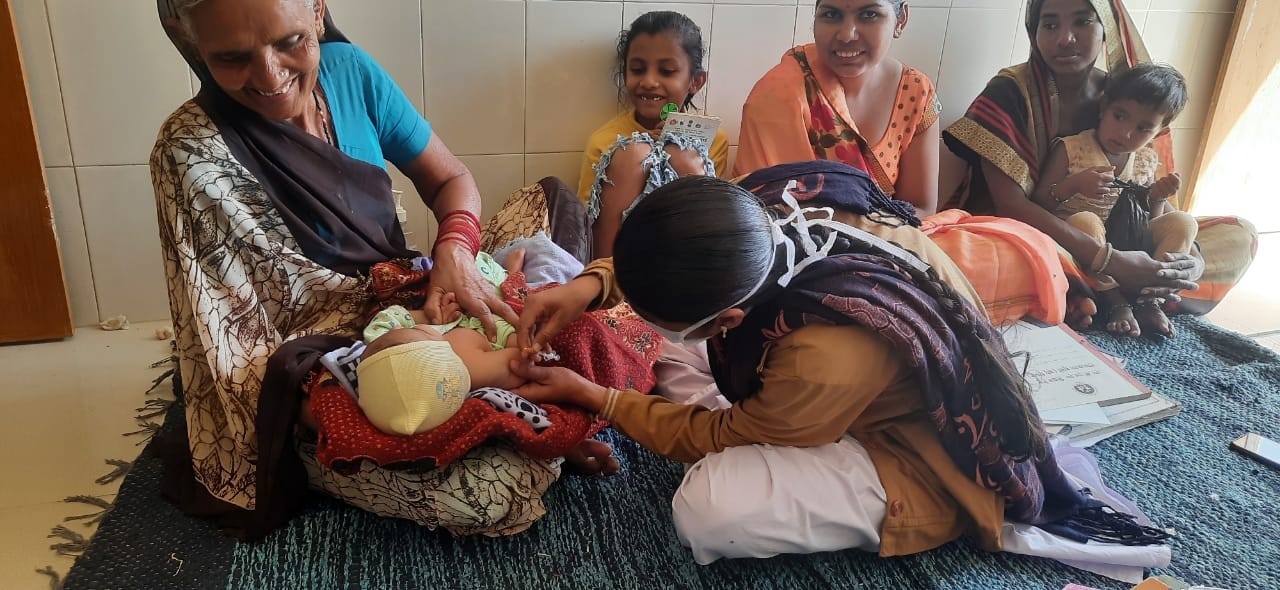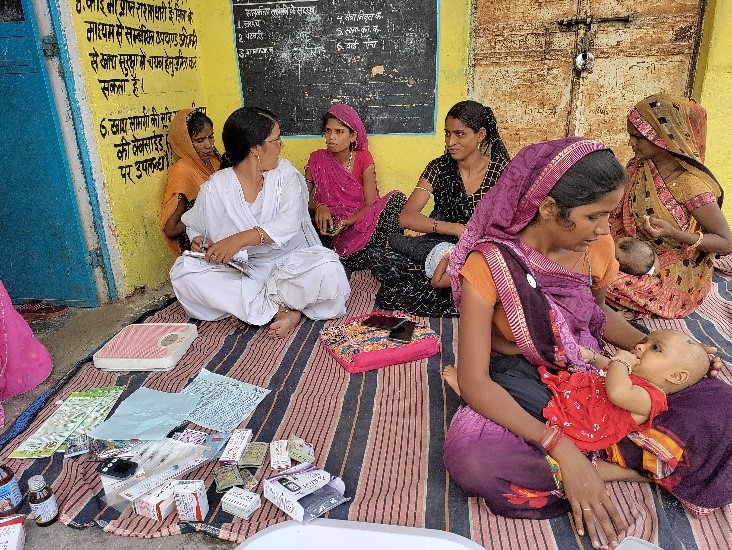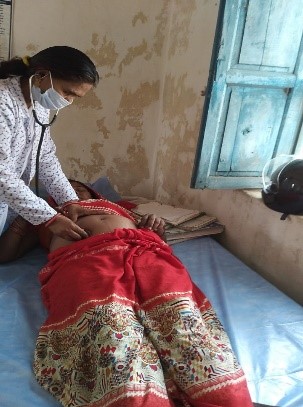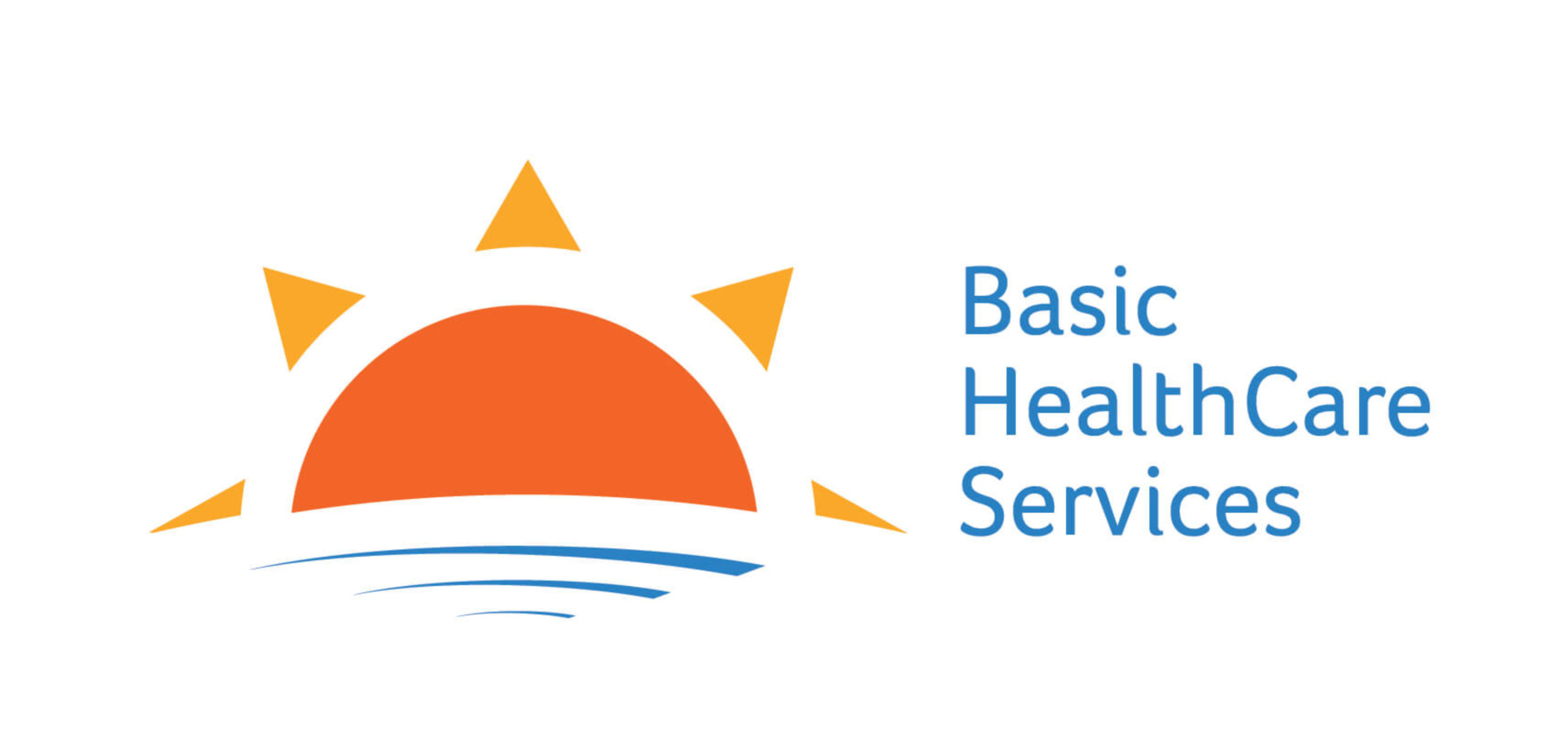Written by Ijyaa Singh, Joint Research Assistant, IIM Udaipur & Basic Healthcare services, Udaipur.
To improve access to maternal health, child health, and nutrition (MCHN) services at the village level, MCHN Day is scheduled for every Thursday in Rajasthan. This ensures that services such as antenatal care (ANC), supplementary nutrition, counselling, and referral are provided at the grassroots level. On this day the Auxiliary Nurse Midwife (ANM), Accredited Social Health Activist (ASHA), and Anganwadi workers collaborate to offer these services to their community. Based on the beneficiary list created by the ASHA, the local ANM prepares a plan for her catchment area. The ASHA gathers the community while the ANM administers vaccinations and addresses malnutrition. All children are weighed by an Anganwadi worker and are identified as healthy or malnourished. If they are identified as Severe Acute Malnourished, extra ration is provided to their family by Anganwadi workers. Counselling regarding nutrition is also provided on the same day.
In addition to vaccination, the ANM conducts physical examination of pregnant women including checking fundal height, FHS, height, weight and also checks haemoglobin count, blood pressure, sugar, and conducts urine test. Pregnant women receive basic services at this first point of care. High-risk pregnancies are identified and directed to the PHC or CHC in the area. Immunizations against six vaccine-preventable diseases are administered to all children. Additionally, MCHN Day serves as a platform for raising community awareness regarding various health issues.
As part of a UNICEF funded project to support better delivery of health services at the grassroots level, BHS and the Centre for Healthcare at IIMU have been working in the field over the last one year. We witnessed many MCHN Days through our routine visits. There were days in which ANM carried only vaccinations with no other equipment or IEC material. There were other days where all the necessary equipment was available, but nobody knew how to use them. And yet other days where all the equipment, and IEC materials were present and being used properly. With time, we came to see that the services were better where there was a strong PHC support system and supervision, whereas absenteeism and subpar services could be seen where there was no supportive supervision. Therefore, we decided that a good way to start would be by offering supportive supervision.
Numerous problems became known to us as a result of frequent visits and supervision. Some ANMs sit in Anganwadis or provide vaccination in some private residence because of the non-availability of the subcentre building. There was no permanent place for them to operate from. A few subcentres have buildings that are about to collapse, and during the rainy season, water collects inside the subcentre causing damage to some of the equipment and medications. The best part though, is that the ANM continues to offer services despite the lack of infrastructure. We began exploring approaches to support them. For that purpose, we spoke with the sarpanch. One of them provided ANM a room in the Panchayat Samiti on a permanent basis. The renovation of the subcentre was completed by another. Such community support and actions significantly aided the enhancement of services.
The majority of ANMs exclusively recognise MCHN Day as a day for vaccinations. They do not offer services such as tests for ANC women, counselling for pregnant mothers, or anything for malnourished children. ANM’s work was restricted to vaccinations solely due to their lack of knowledge about the range of services they could provide. We conducted trainings for ANMs where they learnt how to use all the equipment and understood how crucial counselling was. Following that, additional visits were made to handhold them. Feedback was given continuously, which they appreciated and acted upon. Some ANMs walk, take multiple buses or use other forms of transportation to get to their destinations because they do not have a vehicle. A system for supportive supervision is missing. While they are given new equipment and targets, no trainings are provided to help the ANM master them. Our work has helped in bridging these gaps.
“No one came to assist me like you. I have more confidence in my work now, Thank you!”

Radha recently completed her ANM course and joined at one of the sub-centres in Dungarpur district. We visited her sub-centre six months after she had joined. During our visit, we observed that she had a large stock of expired medicines and all the equipment in the sub-centre were not in an operational condition. She was alarmed upon seeing us inspecting everything and thought to herself that we were there for fault-finding and that we would be reporting her to the higher authorities. We explained to her that that was not our intention and that our only purpose being there was to help and support her.
She stated that since she began working there, she neither had any interactions with the PHC staff nor with other ANMs. There is a sector meeting every month, and the main purpose of the meeting is to ascertain whether each ANM had achieved his/her respective targets or not. Besides that, there were no other discussions or support provided to them.
During our visit to her sub-centre, we also helped her in clearing out all the expired medication and requested that she purchase new batteries for the digital equipment. She promised to get it and set up her sub-centre in a better way.
In similar manner, we visited few other sub-centres and realised that there was a need for providing training to all the ANMs. Therefore, we organized a training session for ANMs of one PHC. Following the training, we visited Radha once again. But she was still having trouble using certain equipment and technology. We provided hands-on training on the spot ensuring that she understood the proper way to use the equipment. This made her feel more confident. We also suggested her to organize the meeting whereby everyone sat on the floor at an equal level. She agreed to this suggestion and began the session on the floor.
She finally said to us, “No one came to assist me like you. I have more confidence in my work now. Thank you.”
After a few months of work and visits, we are able to see that when ANMs are provided positive supervision, they make the best use of the available resources. It is a promising strategy for enhancing outcomes and services. Enhancing their capacity to synthesize and disseminate information contributes to the larger goal of health system strengthening.


